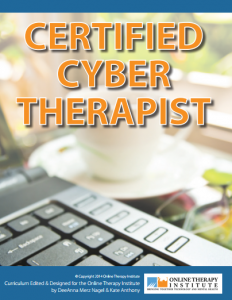 If brevity is the soul of wit, its equivalent in terms of efficiency and speed of progress is sometimes cited as one of the potential advantages of working online. Some proponents of online work take this to the extent of examining single-session interventions, including those where services are provided without the requirement that a formal appointment be made.
If brevity is the soul of wit, its equivalent in terms of efficiency and speed of progress is sometimes cited as one of the potential advantages of working online. Some proponents of online work take this to the extent of examining single-session interventions, including those where services are provided without the requirement that a formal appointment be made.
I will leave aside here questions of the degree to which this should fall under the title of ‘therapy’, sometimes defined as a formally contracted process; some would prefer to think of single-session work as a kind of guidance, support or emergency in intervention but distance provision, whether online or by telephone, has long offered a means of contact, regardless of the title, to people seeking a short, readily accessed means of obtaining help.
The authors of a recent study (to be published by the British Journal of Guidance and Counselling in early 2015), suggest that services that provide one-off contacts have seen rapid growth in the online environment. They found, however, that although there are studies that suggest that the quality of therapeutic alliance that can be achieved – even in these extremely short encounters – can be equivalent to other settings (e.g. Sucala, 2012) and that they can lead to demonstrable, positive improvements in well-being and distress (e.g. Dowling & Rickwood, 2013), only a small amount of research has been carried out on what actually happens in these single-session contacts (Roddaetal, in press).
The authors set out to explore the processes involved in single-session online support work by analysing a sample of 85 one-off text-chat based sessions provided by a total of 25 counsellors at a national service that specialises in addressing gambling problems in Australia (Rodda & Lubman, 2012). Gratifyingly, they did so with a deliberate emphasis on the clients’ points of view which was prioritised over those of the practitioners.
Only around half of the sessions were, in fact, relating to an immediate crisis of some sort, countering the received opinion that emergency help is where single-session work is most commonly focused. Sessions tended to be structured around the client ‘telling their story’ while rather less emphasis appeared to be spent looking at ways of creating change. The authors suggest that traditional models of counselling process like Egan’s ‘Skilled Helper’ model (Egan, 2009) may, therefore, benefit from being adapted to better represent what takes place in online provision of this specific type.
In a separate study to be published in the same journal, Nieuwboer, Fukkink and Hermanns (in press) looked at the effects of single-session support, in this case directed towards the empowerment of parents, by comparing the outcomes achieved by trained and untrained providers. They report that while training in parental empowerment techniques did not make a significant difference to the outcomes achieved, parents who contacted the service and could be included in the study showed a significant increase in self-confidence.
A third paper in this series, which form part of a special Symposium edition on online practice edited by myself and Dr Tristram Hooley, looked at the impact of emotional first aid delivered over the Internet (Gilat, in press). In this study, a follow-up questionnaire was sent out as a means of following up spontaneous email contacts with trained voluntary practitioners who were responding to people in distress under the aegis of the Israeli Association for Emotional First Aid. The study reported that email contact was chosen as a means of help-seeking primarily because of its accessibility and, furthermore, because those clients who had chosen to use the service had a distinct preference for written communication. This could be seen as supporting the position of many online practitioners that work via text based communications has specific advantages not available in face to face encounters. Most clients, especially women, reported that they found the responses helpful. Help was most often perceived as lying in the ability of the service to assist clients to restructure their cognitive appraisal of the situation that had brought them to the service in the first place and, perhaps surprisingly for counsellors and therapists trained not to offer direct guidance to their clients, through practical ways of coping. Email was seen by the authors of the study as offering unique opportunities and mechanisms for providing emotional support that apply just as much in ad hoc, un-contracted support service provision as they do in longer term psychotherapeutic or counselling work that might stretch over many sessions.
This article first appeared in the Summer 2014 issue of TILT Magazine ~ Therapeutic Innovations in Light of Technology.
Click here to read the entire PDF version of the Can just one session of online therapy help article.
Stephen Goss, PhD, is Principal Lecturer at the Metanoia Institute, and also an Independent Consultant in counselling, psychotherapy, research and therapeutic technology based in Scotland, UK. He is also Co-Editor (Counselling) of the British Journal of Guidance and Counselling (BJGC)(http://about.me/stephengoss).
The Special Symposium on Online Practice, edited by Stephen Goss and Tristram Hooley, will be available from January 2015. Some papers already available online, including Anthony, K. (2014) “Training therapists to work effectively online and offline within digital culture” – click here!
Access TILT Magazine archives: http://issuu.com/onlinetherapyinstitute/docs
References
Dowling, M, & Rickwood, D. (2013). Online Counseling and Therapy for Mental Health Problems: A Systematic Review of Individual Synchronous Interventions Using Chat. Journal of Technology in Human Services, 31(1), 1-21.
Egan, G. (2009). The skilled helper: A problem-management and opportunity-development approach to helping: Brooks/Cole Pub Co.
Gilat, I. (in press) The perceived helpfulness of rendering emotional first aid via email. British Journal of Guidance and Counselling, 43(1).
Nieuwboer, C., Fukkink, R.G. and Hermanns, J.M. (in press) Single session email consultation for parents. An evaluation of its effect on empowerment. British Journal of Guidance and Counselling, 43(1).
Rodda, S N, & Lubman, D I. (2012). Characteristics of gamblers using a national online counselling service for problem gambling. Journal of Gambling Studies, Online First 8 January 2013. doi: DOI 10.1007/s10899-012-9352-7


